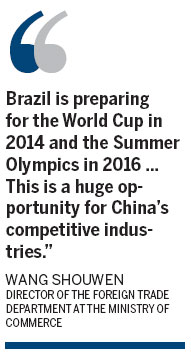

The Chinese government is encouraging domestic companies to grab investment opportunities in Brazil by getting involved in the nation's infrastructure-related industries, Ministry of Commerce officials said on Tuesday at the Canton Fair.
"Brazil is preparing for the World Cup in 2014 and the Summer Olympics in 2016, which is creating tremendous demand for infrastructure construction and consumer goods," said Wang Shouwen, director of the ministry's foreign trade department.
"This is a huge opportunity for China's competitive industries such as machinery, building materials, textiles and apparel."
Lu Yuzhong, an official at the ministry specializing in China-Brazil bilateral trade and investment, said Brazil is still relatively underdeveloped in terms of infrastructure, which has created huge demand for port, road and railway construction machinery.
At the same time, Chinese officials have called on Brazilian business people to have a better understanding of China's exports to Brazil.
"There is a misconception in Brazil that importing products from China is hurting Brazilian industry, and there are continuous calls for trade remedies toward Chinese goods," Wang said.
"What we want to emphasize is that Brazil has been running a trade surplus with China for years. The mainstay of what Brazil imports from China, including machinery equipment and industrial fittings, are indispensable for Brazil's industrial output and upgrading," Wang said.
Electronic products and machinery account for the majority of China's exports to Brazil, while iron ore, soybeans and oil make up the lion's share of Brazil's exports to China, a situation some Brazilian business people are not satisfied with.
But according to China's customs, China only exported products worth $31.8 billion in 2011, while Brazil exported products worth $52.4 billion to China, which means Brazil had a $20.6 billion surplus with China.
In the first nine months of this year, trade between the two countries reached $65.4 billion, up 5 percent over the same period last year.
China overtook the United States this year as Brazil's largest trading partner and largest export destination.
But Cesar Yu, chief representative of ApexBrazil, Brazil's trade and investment promotion agency, said a high domestic tax rate, rather than actual trade remedy measures, is the biggest issue for Sino-Brazilian trade.
"Low price is a big advantage of China's goods, which is creating protectionist calls within Brazil's manufacturing sector for higher tariffs to reduce the competitiveness of Chinese goods," Yu said.
Lu from the Ministry of Commerce added that Brazil's high rate of taxation is a big issue. He said that according to a report from the World Trade Organization, the country's average tariff rate for non-agricultural product reached 14.2 percent in 2010. For apparel, the rate even reached 35 percent.
Experts have called for more China-Brazil joint ventures to overcome the problem.
By the end of 2011, China had invested $15.1 billion in Brazil, while Brazil is China's largest investment destination in Latin America, according to the Ministry of Commerce. But this investment has been focused on the oil and mining industries.
"China could increase its investment in the manufacturing sector. Brazil is a large market and is entering the ranks of high-income nations. There is huge demand in areas such as electronic consumer products," Lu added.
Wang from the ministry's foreign trade department said Chinese enterprises in Brazil should compete in fields that are not that directly competitive with Brazilian industries.
"Chinese enterprises should invest enough time and people in market research before rushing into the Brazilian market, and avoid sectors that are too competitive," said Yu from ApexBrazil.
zhengyangpeng@chinadaily.com.cn